You Can Save Your Small Business
If you’ve noticed your Google rankings sinking this year, you’re not alone. Small business continues to get hammered by Google who continues to enjoy a monopoly on web search.
Small businesses are seeing their visibility universe shrink slowly and silently each month. Many toil with minor issues but lose site of the bigger picture — that you’re slowing being strangled more each month. Sometimes we need to take a breather and look at the big picture. The big picture is creating all your pain and destroying your confidence in marketing.
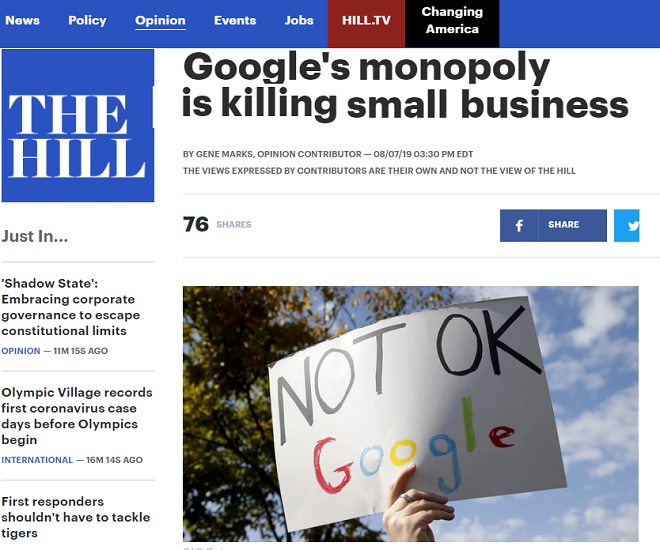
Search Engine Ranking Updates Fit a Consistent Pattern
The last round of Google algo changes in June and July which Google’s engineers dubbed a 2 part “core algo update” basically wiped away links to small businesses and bloggers. If you’re not a search engine optimization strategist, such changes and lost rankings are a mystery.
A good SEO consultant knows this persistent suffocation of small business and why, and the algo changes are conducted in accordance with Google’s profit ambitions. Wiping out links hurts SMBs more than it does big businesses who have a wider array of inbound links (because they big marketing budgets). It’s not fair, but Google’s engineers strangely don’t seem to care.
Does it mean SMBs can’t rank highly and should give up? No, if you are gifted and have a knack for creating the right content and optimizing it well, you can rank very highly. The reason more people are using spam technique though is because ranking is very difficult. Google’s making it way too hard by skewing the algorithm away from what small business can produce. Great content doesn’t create guaranteed wins.
Skewing in Favor of Big Business is Bad for Long Term Results
Google’s profit ambitions are myopic and the damage is being recognized by politicians. It’s been happening for more than a decade and you have to know there is an end point to monopoly. But we’re not over it yet, and nothing has happened to Google (and Facebook) so far. Google founders Page and Brin did exit the scene and left Sundar Pichai with a mess. But he doesn’t seem too nervous which tells us this squeezing of small business (which I explain below) will continue.
Google needs to do a 180 and embrace small business as their preferred choice. Small business is the future, and they’ll make plenty of profit.
Such Google search engine core algorithm updates don’t seem to phase large corporate websites whose rankings remain consistent. Almost nothing upsets their dominance. They can pump the worst content and still rank at the top. Amazon’s growth in the rankings is particularly troublesome for small retailers who huge employers throughout the US and world economies.
These updates are the crux of conversation you will see in forums and blogs today where small business people and amateur SEOs are left scratching their heads, toiling to understand Google’s mysterious black box universe. It’s a big problem for startups especially since it undermines confidence in cost effective marketing. The worry here for startup entrepreneurs is that they’re going to pay full fare on Google and Facebook advertising platforms for leads and visibility. They can’t afford it.
Facebook Owes its Success to Google
Every adjustment in Google’s algorithm that kicks SMBs out the door welcomes big advertising revenue gains for Facebook. You’d think Google would stop transferring this huge advertiser base and cash flow to Facebook and Twitter and find a way to keep SMBs loyal to the realm of their organic search. The loss to FB might be more than Google’s actually gaining from the squeeze! And the loss of revenue to their own network of advertiser blogs is shrinking too. They’re cannibalizing themselves.
Mindlessly, they keep up the same squeeze shtick every month as if wringing the last drops of water from an old rag.
But alas, Google is not the same company as it was twenty years ago, and they rely heavily on user’s tolerance and apathy for bad behavior from tech monopolies.
Is the DOJ, Democrats and Republicans big talk about taking down Google, Amazon and Facebook real? I would say it’s still political theater, but when inflation really sets in, this could actually happen. Consider that they’re called “anti-trust” hearings focused on collusive, unfair damage to consumers not small business. There are no monopoly laws. Once companies become solidly entrenched as monopoly or oligopoly leaders, they’re almost impossible to deal with.
This is why the anti-trust hearings are so important. The monopolies won’t ease off and find a different path. They refuse to release their prey and the only solution is political.
Zero Transparency Is Your Big Clue
Will Google be saved by millions of small business voters in the upcoming elections? Will the homeless protect them? Will the Republicans woo them for 2022 election funds? Are these companies even slightly nervous? Do they try to be transparent?
If they don’t have to be fair or transparent by law, the only way for things to change is legal action.
Small business will see organic marketing completely disappear and most of them will never get into the kill zone for big business threat elimination. As small business fails to pay the fare, they risk disappearing forever. In the war of taxes, small business will always lose, regardless of what politicians might claim is happening. Big business will win as long as the current economic system persists. Small business has no international footprint and competing against rising cheap foreign competition is the biggest problem ahead. This will get worse.
SMBs need to evolve with their marketing with more reach, creativity and a very focused value proposition. Most SMBs fail within 5 years. Without cheap, free organic exposure, and increasing paid ads via a few channels, it’s hard to be optimistic about these years ahead. SMBs are hurting from the pandemic and don’t have big cash reserves. Some have gone into debt to keep their employees. Most government aid and big taxes breaks have gone to big business and it’s made them even more dominant.
So let’s get clear about what’s really going on. If the real problem is monopolies, friendly government handouts, and corporate tax breaks, then we need to respond to it. Lets see the Google search algorithm as part of the bigger unfairness and bias.
Small business owners see the downward trend in their web statistics and sales. Look at yours and compare 2021 to to 2017 and 2018 and what do you see? Leave a comment below. And as your website traffic and visibility sinks, large corporate and media sites with poor, superficial content are seeing the reverse – rising traffic.
It’s never been fair, but right now as we try to climb out of the recession, it just seems wickedly self-serving for Google to putting a further squeeze on.
Google just completed its much vaunted Core Metrics update in June and July, and the end result in search results is very apparent — small businesses are gone with the big companies capturing the top rankings.
And let’s face it, if a company can’t rank in the top 6 spots, traffic is almost zero. Google makes it hard to find the button to the 2nd page of results and fills the page with extra material to keep clicks to that first page of results. This helps them sell more advertising. This was considered spam previously and Google actually punishes website owners for doing the very same thing on their websites.
And since Google hides what they do, it’s impossible for small business owners to understand what’s happening or do anything about their loss of rankings and traffic. And while an SEO expert is a great help, these attacks on the small business ship are producing greater damage. While I enjoy helping small businesses beat big corporations online, every year the challenge becomes more daunting. Competing against huge ad budgets is tough.
As government stimulus funding tapers off, and as SMBs prepare to stand on their own feet, they’ll find it more quick sand in the desert. There is a simple solution to SMB health, bring competition to the digital space again (like the early 2000s) and break up Google, Facebook and Amazon. If there is another solution, please comment below.
Let’s take a look that the realm of search and why this shift to big business continues.
In fact, Google says more frequently in announcements that there’s little you can optimize for or do about it. So now they’re trying to actively discourage you from any kind of optimization or feeling of control.
The writing is on the wall for small business, that your Google traffic will diminish further. And ask yourself whether Facebook can replace that loss? Facebook has shrunk their feed reach significantly too. With Google them enjoying 90% of the web search market, it’s not likely you’ll survive without appearing on Google. But when a company has a 90% monopoly it must operate to higher standards.
The US and European governments appear to understand some of this, but whether anything will change is a question mark. There is a growing call to break up Google, Facebook, Apple, Amazon and the rest of the FAANGs. If this doesn’t happen, small business health and outlook is definitely threatened.
It’s not a jab at the ownership of the companies. It’s simply the end of a game of monopoly. A new game must be started with a level playing field. The next recession will bring this point home deeply.
Big Companies Are Eating Your Lunch
A report from Matt Bentley of CanIRank published on Entrepreneur.com showed that big companies and brands predominantly ranked in the top 3 positions on Google even though their content was inferior. Here’s some very interesting things he discovered:
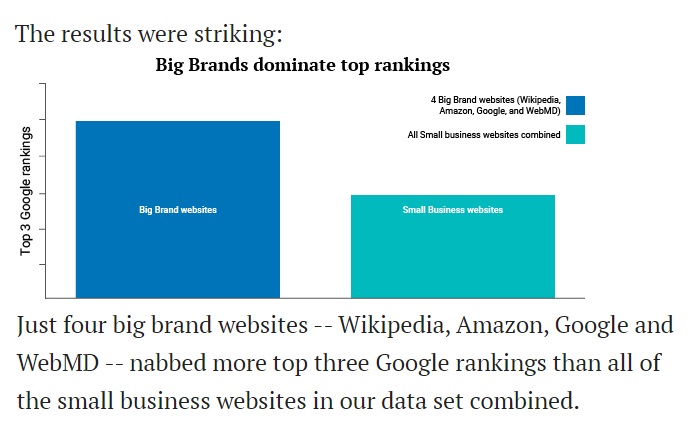
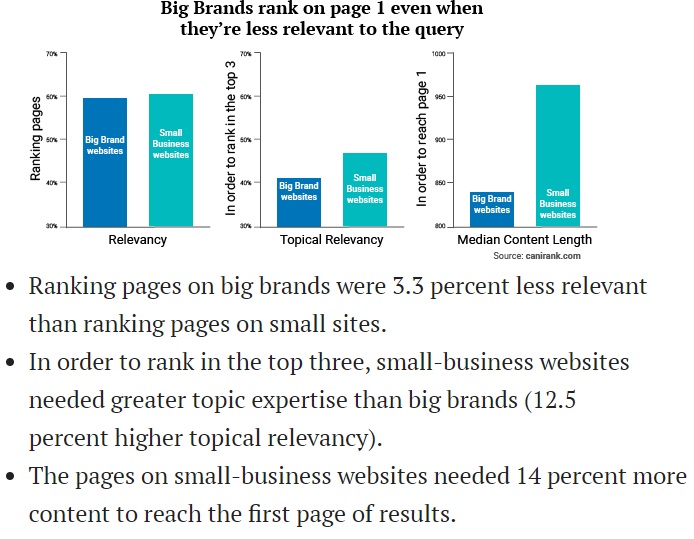
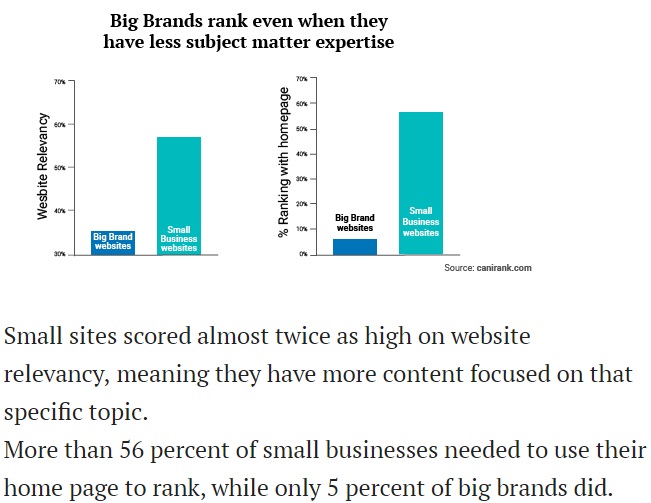
Matt doesn’t say why Google does it, but I explain this below. It’s all about money. What his research and article shows however is that poor quality content from big business does rank high, which refutes Google’s search engine spokesperson’s claim that it’s all about quality and the user experience. And user experience on small sites is often clearer, more comfortable, less cluttered, and faster than it is on big corporate sites.
What Can You Do?
You can be better than corporate marketers and draw more visitors to your content. That means putting more effort into research, content creation, content strategy, and building reach out onto the web and social media networks.
And this is about more than just search engine optimization.
It’s part of a process of “marketing your marketing” because when you extend your reach online, you build brand awareness, test your value proposition, and reach full contact and full value of the market, and grow contact with customers and the people who fit into your business support network. You’ll attract new referral business leads in different ways.
This is not to suggest it’s easy. You need expertise, time, strategy and energy. You’ll have to refocus your budget into marketing and into this “reach building project.” When you get this strong focus and effort, you’ll begin to learn what you need to do specifically for your business and where your opportunities are. You have to dive in.
Core Metrics, Page Experience, EAT, Mobile Usability and more
These named ranking algorithm updates Google made on its aging ranking system are technical and would bore you. However, to a long time SEO Consultant, these database indexing changes take on familiar timbre. Each technical ranking method might be different, but they all have the same goal — to rank site’s Google prefers over those they don’t.
The end result of their changes brings a consistent result — big business and big media sites rise and small business sites and blogs fall. And small business sites that try too hard might receive an extra push down the rankings.
Google’s Authority Sites Aren’t Well Respected
Google often cites quality, authority, and trustworthiness in their public announcements about rankings. However, if trust is a key factor, then why are the most untrusted organization’s websites ranking at the top for most keyword phrases?
A poll released just this week by Gallup and the Knight Foundation, suggests American’s don’t trust the media, institutions, and many believe the media is responsible for dividing the country.

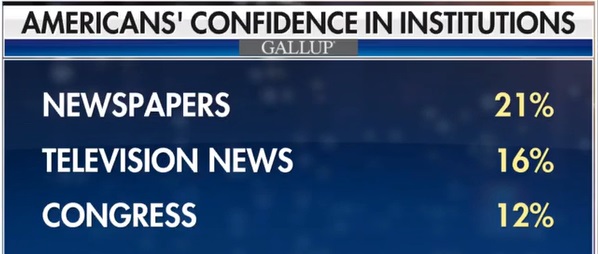
56% of Americans say their go-to news source has some form of “bias,” 20% felt their preferred source had a great deal of bias, and 36% believe “a fair amount” of bias is present — Fox news. That’s not a vote of confidence for the sites Google ranks well.
Another poll by World Economic Forum (WEF) based in Geneva, Switzerland found that about 52% of the 36,000 people questioned in 47 countries said they had little or no trust in large national companies, while 48% distrusted multinational firms. 51% distrusted their national legislatures.
So big business, government, and the media, the so called authorities are not trusted, yet Google considers them to be the most credible pillars for their search result product.
Relying on Paid Advertising Damages Your Brand
There’s a revenue reason why small companies and bloggers have disappeared from the results. It’s not that bloggers can’t be brilliant or relevant, or that small companies can’t produce astonishing level quality content. The issue is that by blocking smbs out of the organic search results, Google can squeeze out hundreds of billions of dollars in ad revenue from these dislocated companies.
If SMBs can’t get exposure in organic results, they must use paid Google advertising. Google’s ad revenue has exploded at the same time that small business was kicked out of the search results.
The knowledge graph, AI, and more are constructs Google uses to further support their business view of the Web which ultimately leaves small business outside and disconnected. Big businesses have more promotional resources to cover every opportunity that small businesses use. And they push us out.
Big Corporations are Drying up the Small Business Economy
The media treats the anti-monopoly, anti-trust regulation action from Biden and the DOJ as a threat to big tech’s earnings and stock market value. However, the real threat is to the existence of small business who will see their situation worsen. As big companies continue to grab more walletshare (and search engine rankings) small businesses cease to be relevant.
And in this post pandemic K-shaped recovery, small business is in a vulnerable position. SMB owners must help themselves whether it’s with search engine rankings, or lead generation, and even product/service development. We all have to view ourselves differently now.
So politically, technically, financially, big business can remove access entirely thus helping to confirm Google’s ranking algorithm’s priorities. You fight back via better, more fresh and relevant content, networking with other small businesses and by marketing your marketing.
Many small businesses have gone out of business or have been severely injured financially because of search engine updates.
The best response to this tragedy is to refocus on creating quality content and making reference to each other, instead of the big media news reports.
As part of your strategy to improve your Google rankings, you’ll need to create valuable content for other small companies and encourage them to use it, share it, and talk about it. Create value for sure, but create a little emotion that generates engagement. And you need to promote, share and authenticate their content, and let them know that reciprocol admiration will help each other.
If you’re going to move other people, a sincere show of support and value creation will build links and shares for you.
On your side to help in the research, creation and distribution of content that will give you the links, citations, shares and traffic, is an SEO consultant.
Each Update Hurts More than the Last
This last update in early July was more troublesome than usual. The top rankings are clearly more dominated by big media corporations who are obviously enjoying their rising traffic.
As everyone’s rankings fall, their traffic falls, which means less traffic is referred to your site from other small business sites and bloggers. Without referral traffic, your back is against the wall.
It’s important not to get desperate and launch a spammy link building scam to give yourself a boost. It won’t work. Even if you buy links, they’ll disappear after a couple of months or lose their boosting power quickly. That’s a waste of money and time.
Re-energize Your Outreach
Instead, it’s time to re-energize your outreach. Outreach is about reaching website owners or social media connections who can promote your business somehow.
The content you need to do this includes:
- posts, graphics and videos that are informational and helpful
- posts, graphics and videos that are newsy and current
- posts, graphics and videos that are entertaining, surprising, and which they want to share with others
- tweets and FB posts that help you engage with your FB connections
- social media commenting, hashtags and @mentions to reach more people
- curated news stories or feel good articles just to share to gain attention
Social shares are good, but social likes don’t count at all on Google (or Facebook’s feed ranking). The ultimate goal is to have your content linked to from news reports, blogs or company pages. These pass ranking power and keyword info which helps you rank higher.
Should you do outreach emails to request directly with website owners? No, it’s considered spam now because so many people do it just to get a link. Typically it’s a poor quality link.
Just a note about link building. Google is actually trying to find a way to lower the value of links and even direct keywords as signals. They’re doing this now. Part of a sophisticated SEO strategy from a search engine optimization consultant includes techniques that don’t rely solely on keywords and links.
Blogging with an Outreach Purpose
High quality blogging designed to help you reach targeted website owners is the best route. This content then is designed from the ground up to appeal to and entice others who publish content. Helpful blogs, research reports, business case studies, customer experience reports, tours, industry events and happenings are just a few content ideas that work well to gain attention of key people online including influencers.
By mentioning them or their company in the article (mention how they excelled and how their product helped) and positioning them as someone vital makes them look good. It makes you look generous and more interesting too.
Your post would be written as a legitimate informational post but strategically includes many people and businesses who will enjoy being included in it. And isn’t rare that we would be included in someone else’s article?
Some big companies won’t allow such promotion of strangers or industry people. This is why their SEO efforts fail. You have to give something to get something back.
- Ask your satisfied customers for a review and to write a post about your products/services and to share their thoughts on social media.
- Guest posting is a top way site owners try to get reach on other websites. It can be vital however Google does consider it spam and guest post requests are treated the same as link requests.
- Content partnerships with Influencers. Influencers are the celeb’s of the new digital era and working with them on a project which they can benefit from and promote, could work well for you. With a tangible research report, case study or infographic, you have something that can be shared and placed on other websites, or placed on your website where others will link to it.
- News reporters and journalists. Journalists often write for big media and a link from those sites would be powerful. You need a powerful story, event, or interview to reach them. Local reporters shouldn’t be ignored as they have websites with a little authority and keyword relevance.
That’s a lot of ways to get your name, brand and influence out there on the web and social channels. It’s hard work and does take some time. From planning, to strategy to content development and social engagement, It’s the effort that prevents most companies from doing outreach.
If your goal is to become a market leader and enjoy a big jump in sales revenue, this is a wise investment during a time when Google and big media are squeezing you out of the business picture. Don’t let them succeed.
Additional Insight: SEO Consultant , Real Estate Marketing and Real Estate Marketing Packages.
Travel Software Marketing | Bleisure Travel Marketing | Travel Management Software | SaaS Marketing | Travel Marketing | Business Travel Marketing | Travel SEO

